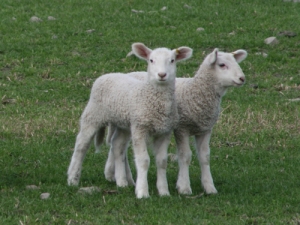Move over ham, here comes lamb
It’s official, lamb will take centre stage on Kiwi Christmas tables this year.
 Beef + Lamb NZ estimates 23.9 million lambs were tailed this spring – the smallest lamb crop since 1953.
Beef + Lamb NZ estimates 23.9 million lambs were tailed this spring – the smallest lamb crop since 1953.
Beef + Lamb NZ estimates 23.9 million lambs were tailed this spring – the smallest lamb crop since 1953.
Lamb export receipts for 2015-16 are estimated at $2.8 billion, down 4.2% on 2014-15.
B+LNZ Economic Service chief economist Andrew Burtt says the tally reflects three key influences.
"Breeding ewe numbers were down 4.5% on last year, due to carry over effects of dry conditions in past seasons," he says. "Lambing percentages across most of the country were down, as a result of tight feed supplies leading into winter. And fewer hoggets were mated."
In some regions, there was also a slight swing towards increasing beef cattle, at the expense of sheep.
"On the positive side of the ledger, better-than-average climatic conditions during lambing this spring meant lamb survival was good, the exception being isolated weather events in the North Island."
Over the country, there was a 6.7% drop – or 1.7 million fewer lambs than last year; 11.3 million lambs were tailed in the North Island – down 0.7 million on last year but similar to 2013's tally. In the South Island, 12.6 million lambs were tailed – 1 million fewer than last spring, due to decreased ewe numbers, lower lambing percentages and fewer lambing hoggets.
Burtt says the average carcase weight is expected to increase slightly – by 0.9% – to 18.3kg, as a result of lower stocking rates per hectare. "However, this is not sufficient to offset the reduced number of lambs available and we expect total export lamb production to drop by 7.2%."
The lamb crop survey covers 500 commercial sheep and beef farms, which are statistically representative of New Zealand's commercial sheep and beef farms.
Coming in at a year-end total at 3088 units, a rise of around 10% over the 2806 total for 2024, the signs are that the New Zealand farm machinery industry is turning the corner after a difficult couple of years.
New Zealand's animal health industry has a new tool addressing a long-standing sustainability issue.
The Government has announced that ACC will be a sponsor of this year's FMG Young Farmer of the Year competition.
As veterinary student numbers grow to help address New Zealand's national workforce shortge, Massey University's School of Veterinary Science is inviting more veterinary practices to partner in training the next generation of vets.
South Island dairy farmers will soon be able to supply organic milk to Fonterra.
Norwood has announced the opening of a new Tasman dealership at Richmond near Nelson next month.

OPINION: Meanwhile, red blooded Northland politician Matua Shane Jones has provided one of the most telling quotes of the year…
OPINION: This old mutt has been around for a few years now and it seems these ‘once in 100-year’ weather…